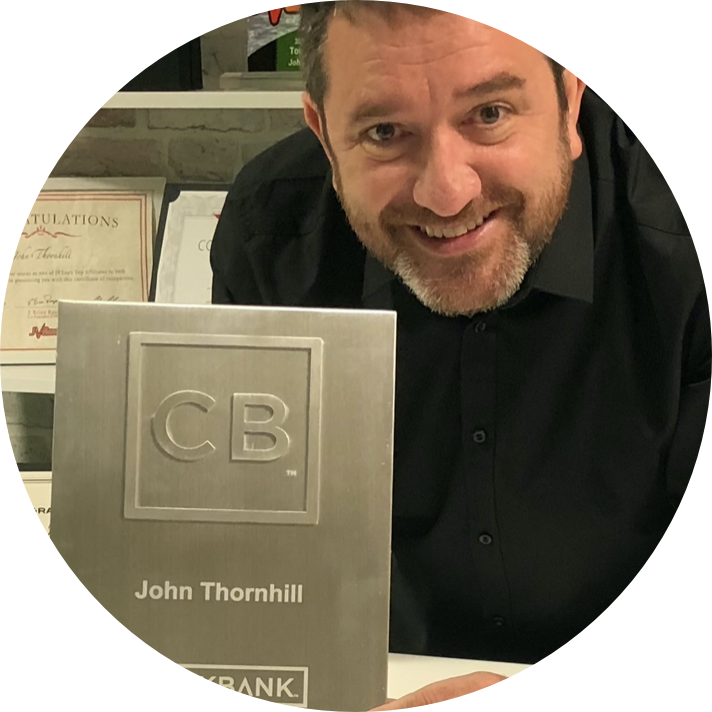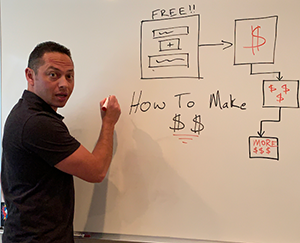Weekend Favs July 20 written by John Jantsch read more at Duct Tape Marketing
My weekend blog post routine includes posting links to a handful of tools or great content I ran across during the week. I don’t go into depth about the finds, but I encourage you to check them out if they sound interesting. The photo in the post is a favorite for the week from an […]
Transform Your Leadership: The Power of Thoughtfully Fit written by John Jantsch read more at Duct Tape Marketing
The Duct Tape Marketing Podcast with John Jantsch
In this episode of the Duct Tape Marketing Podcast, I interviewed Darcy Luoma, an expert on leadership and personal development. Author of Thoughtfully Fit® and Certified Speaking Professional, Darcy Luoma is a highly sought-after coach and speaker who has worked with over five hundred organizations in forty-eight industries to create high-performing people and teams. The concept of “Thoughtfully Fit” is a framework designed to help individuals and teams enhance their performance and navigate challenges with greater agility. This episode is packed with rare insights on transforming any agency’s leadership approach by integrating thoughtful practices into your daily routines and organizational culture.
Key Takeaways
Questions I ask Darcy Luoma:
[01:58] How do you go about making high-functioning people?
[03:01] What is the difference between being physically and thoughtfully fit?
[04:12] Talk about how the framework helped navigate your personal life.
[06:00] What role do our thoughts play in how we show up or act?
[08:11] How hard is it to make progress with people unaware of their blind spots?
[10:47] What does a coach do compared to a consultant or advisor?
[18:39] Is practice key, or are there other ways to improve?
[20:48] Is there someplace you want to invite people to connect with you and grab a copy of Thoughtfully Fit?
More About Darcy Luoma:
- Visit her Website
- Check out her LinkedIn
- Grab a copy of Thoughtfully Fit: Your Training Plan for Life and Business Success
Like this show? Click on over and give us a review on iTunes, please!
Connect with John Jantsch on LinkedIn
This episode of The Duct Tape Marketing Podcast is brought to you by ActiveCampaign
Try ActiveCampaign free for 14 days with our special offer. Exclusive to new customers—upgrade and grow your business with ActiveCampaign today!
Speaker 1 (00:00): I was like, I found it. I found it. This is what I’ve been looking for. I can honestly say it has genuinely changed the way I run my business. It’s changed the results that I’m seeing. It’s changed my engagement with clients. It’s changed my engagement with the team. I couldn’t be happier. Honestly. It’s the best investment I ever made. What
John Jantsch (00:17): You just heard was a testimonial from a recent graduate of the Duct Tape Marketing certification intensive program for fractional CMOs marketing agencies and consultants just like them. You could choose our system to move from vendor to trusted advisor, attract only ideal clients, and confidently present your strategies to build monthly recurring revenue. Visit DTM.world/scale to book your free advisory call and learn more. It’s time to transform your approach. Book your call today, DTM world/ scale.
(01:05): Hello and welcome to another episode of the Duct Tape Marketing Podcast. This is John Jantsch and my guest today is Darcy Loma. She’s a highly sought after coach and speaker who’s worked with more than 500 organizations in 48 industries to create high performing people and teams. She balances running her thriving business with raising her two energetic teenage daughters and competing in triathlons. She’s also the author of a book we’re going to talk about today, thoughtfully fit your training plan for Life and Business Success. So Darcy, welcome to the show.
Darcy Luoma (01:38): Thanks, John. It’s great to be here.
John Jantsch (01:40): Can you make me a high performing people? I really, that would be amazing. Can we just spend 20 minutes working on me?
Darcy Luoma (01:46): Absolutely. You know what the number one thing is, John, if you want to be high performing. Absolutely. We cannot make someone be high performing who just loves being a couch potato and metaphorically, right?
John Jantsch (01:59): Yeah. So I’m going to jump around and get way off my question that I was going to ask. I suspect you have lots of people that say, Darcy, I read your book, fix My People.
Darcy Luoma (02:08): Yes.
John Jantsch (02:09): And so how does that go?
Darcy Luoma (02:12): Well, how that goes. I mean, absolutely. And one of the things I’ll say, if there’s, whether it’s A-C-H-R-O or a president or whoever it is that calls and says that depending on what they’re looking for, let’s just say they say, I’ve got a vp, and here’s what’s really common. John, the person, whoever it is, whatever their title is, they’re really good at their job at the technical. They’re a great lawyer, they’re a great engineer, they’re a great carpenter, whatever it is, but they struggle in the interpersonal and the team dynamics and the leadership. And so if they come in and say, fix them, the first thing that we’ll say is, do they want to be fixed? And do they think that they have a problem? Because save your money if they don’t think they have a problem and they don’t want to improve, that’s what’s key. That’s the first of success.
John Jantsch (03:01): So the book is thoughtfully fit. You do play a little bit on, obviously you’re physically fit and you play a little bit on that metaphor. What’s the difference between the two really in your mind?
Darcy Luoma (03:11): Yeah, yeah. It is a metaphor and what I find is when I train and practice for a triathlon, I do better. I get better results. I am less likely to get injured. They’re more fun, I feel better afterwards. The same thing is if you want to get better results in work and in your relationships in life, you need to train and practice. So most of us don’t know how to have a tough conversation, how to deliver hard feedback, how to say no when you’re overwhelmed and you’re asked to chair the volunteer fundraiser in your community and you feel so bad. So what I find with coaching clients is that what we do in coaching, they’re coming in, they’re essentially training and practicing so that they can have better results and fewer regrets in life. That’s the through line for the metaphor being physically fit and thoughtfully fit.
John Jantsch (04:00): So you start the book off with a chapter in your life that was a little tough. I’m sure you’ve told the story a hundred times. You don’t have to go into the details here, however, talk a little bit about how, I mean, you talk about in the book that the framework that you’ve developed actually help you get through that. Talk a little bit about how that model helped you navigate.
Darcy Luoma (04:19): It really did. I mean, whether you’re a business person or an entrepreneur or, so, we have challenges, we have problems, we have uncertainties, whatever it is, big or small. I’m no exception. So when my life blew up, I found myself at a place where I needed to. I didn’t need to. I had just finalized the thoughtfully fit model, and in this case, I’ll give just the tiniest context. I’m happy to share more, but what my husband was arrested for sexual assault of a minor, and I had to hire my own attorney, and my attorney said, Darcy, don’t talk to anyone about anything. And so here I was at the worst moment of my life and my support system was cut off. And so I became ground zero to test drive this model, which we incidentally had just finalized five days before. To be able, at the core of the model are three simple steps. You pause and think before you act. And so there were so many examples, John, where I was blindsided and I was caught off guard, and I was just in a world of hurt. Where had I reacted in the moment? I would have done something or said something I’d later regret. And so I became really the test case to utilize the thoughtfully fit model in my own life.
John Jantsch (05:38): So one of the first, I mean the framework has three major components. Each of those components has a couple of steps. You hinted at a couple of there, but let’s back all the way up to how unaware are we of what our thoughts do to us in terms of, again, I say unaware. I think a lot of ’em are subconscious, they’re habitual. They’re what role do our thoughts play in how we actually show up or act?
Darcy Luoma (06:05): Everything they absolutely do because you think about if you show up at a meeting and somebody is leaning back and their arms are crossed and they’re disengaged, and your thoughts are, you know what? He never liked me. He didn’t think I should have gotten this promotion. And your thoughts start going, it affects your behavior and all of a sudden you’re acting and you’re snippy or you’re short, you’re cutting ’em off. There’s a
John Jantsch (06:29): Direct correlation. You’re sweating. You’re right.
Darcy Luoma (06:32): Yes, yes, exactly. There’s a direct correlation to our thoughts that feed into how we’re feeling and what our behaviors are.
John Jantsch (06:40): Yeah, yeah. I remember when I first started speaking 25 years ago on stages, and I mean I had never done it before, but I knew I needed to, so I got out there and did it. But I remember, I mean, I would get hot and I would get mean physically because I’m always thinking, am I smart enough or do they like me instead of what am I here to give, which you eventually come to, but it’s actually not just your actions. I mean, I think it’s your physiology, isn’t it?
Darcy Luoma (07:07): Absolutely. And so the key is it’s not to minimize those thoughts or make those thoughts go away. Our humanity, we’re going to have that imposter syndrome and Oh, am I ready? Is this audience, do they believe me and all that? That’s our humanity. When you’re thoughtfully fit, you raise your awareness of those thoughts. So instead of those thoughts controlling, you have awareness, and then you can consciously choose like, okay, you know what? Whether or not I’m the right person to be on the stage, I’m here and I’m going to knock it out of the park so that you can reframe it and choose how you’re going to move forward despite those thoughts, that can be really, like you said, that can really create the physiological response in you.
John Jantsch (07:50): One of the things, I’ve interviewed lots of people that write leadership books and coaches that work on trying to help people get to achieving their goals. And it seems like a theme, a common theme that I hear over and over again is the either lack of or need for or work on self-awareness before you can even start the work. Do you find that in yours as well? I mean, when you’re working with somebody, if they aren’t aware of their blind spots, if they aren’t aware of how this is going on, it’s pretty tough to start making progress, isn’t it?
Darcy Luoma (08:19): Absolutely. You’re right on. And I think that’s probably, if there’s anything that’s most important, that’s where it starts. And I even think about John as a triathlete. So I have a coach and we just started open water swimming two weeks ago here in Madison, and I’m out there swimming, and I’ve been swimming a long time, and my coach will point out my blind spot. She says, Darcey, you right arm is crossing way over your body, and that’s why instead of swimming straight, you are swimming to the left. That is something that without that awareness can’t, it’s a blind spot for me. And with that awareness, now I can adjust what my behavior is and straighten it out. In that case, literally, it’s the same thing with how we show up, whether it’s as a leader or a team member, if we aren’t self-aware of the impact we might have RB F1 of my speaker friends calls RBF resting bothered face. You might not be aware that people think that you’re angry or upset when in the reality is like, oh, I’m just thinking and this is my thinking face.
John Jantsch (09:29): Yeah, it’s my pleasure to welcome a new sponsor to the podcast. Our friends at ActiveCampaign. ActiveCampaign helps small teams power big businesses with the must have platform for intelligent marketing automation. We’ve been using ActiveCampaign for years here at Duct Tape Marketing to power our subscription forms, email newsletters and sales funnel drip campaigns. ActiveCampaign is that rare platform that’s affordable, easy to use, and capable of handling even the most complex marketing automation needs, and they make it easy to switch. They provide every new customer with one-on-one personal training and free migrations from your current marketing automation or email marketing provider. You can try ActiveCampaign for free for 14 days and there’s no credit card required. Just visit activecampaign.com/duct tape. That’s right. Duct Tape marketing podcast listeners who sign up via that link. We’ll also receive 15% off an annual plan. That’s activecampaign.com/duct tape. Now, this offer is limited to new active campaign customers only. So what are you waiting for? Fuel your growth, boost revenue and save precious time by upgrading to active campaign today. So you mentioned coach, it seems like these days, coach, consultant, advisor, agency, I mean, the terms seem to all be blending together In your definition, what is a coach there to do?
Darcy Luoma (10:57): Well, I’m a little bit of a stickler, John, and most of the world isn’t a stickler, but I have. So I’m a master certified coach and I’ve worked my tail off to earn that degree. And what basically, the reason I say I’m a stickler is because when you’re a coach and you’re truly doing pure coaching, you’re holding the other person as the expert, whether it’s the client or the team or the relationship. They have the answers and the wisdom and the expertise. And as a coach, you are helping. You’re mirroring back what you’re hearing. You’re asking tough, powerful questions. You’re pointing out blind spots and hard truths. If I come in as a teacher, a mentor, an advisor, a consultant, I’m the expert. Let me tell you what, and both are valuable. I’m just a stickler that be clear on what you’re doing and have the ethics to be able to articulate which hat you’re wearing in any moment.
John Jantsch (11:53): Do you sometimes have to fight this to say it’s obvious dummy? Here’s the answer.
Darcy Luoma (11:58): When I first started, absolutely, that was the hardest thing ever. I train coaches and that’s one of the first things they say is, but darcey, why would I ask a question when I know what they should do? And that’s a false premise because you have no idea what they should do. You know what you think they should do based on your history, your beliefs, your stories, your values, but you have no idea what they should do. Once I got through that and started to get better results when I resisted the urge to fix, tell, solve, advise, now it’s easy. Now it’s not even hard to resist because it’s so much more powerful, but absolutely the first several years, it was painful. It was so hard.
John Jantsch (12:40): One of my favorite quotes, I attributed Stephen Covey, somebody probably said it before him, but as no one sees the world as it is, we merely see the world as we see it or as we are. And I think that’s so true. I mean, you really have no ability to assess what’s going on because you never have all the information. So break down your framework a little bit. We started talking about the core, go ahead and maybe give us the high level sketch.
Darcy Luoma (13:05): Yeah, the high level. So we started looking at what are the themes. We started to see, okay, we’ve got all these clients that come in. At the end of the day we say, okay, what do you want coaching on today? And we found that there are six main obstacles that get in the way of peak performance. Three are internal where we get in our own way, and then three are external where there’s challenges with other people. And so I’m happy to give a high level sketch of those six if you’d like or not.
John Jantsch (13:30): Yes, do it. Yeah.
Darcy Luoma (13:31): So the first one is there’s so much to do. I can’t even think that aligns with the thoughtfully fit practice of stillness, which is about being able to quiet the mind. And of course, just like if you want peak performance as an athlete, you need rest days. You need to recover your muscles, build stronger. The same is true if you want to be thoughtfully fit. The second internal practice is we have clients coming in saying, oh, Darcy, here’s what I’m coaching on. I didn’t handle myself the way I wanted to and name the situation. And this is the practice of strength, which is being able to consciously choose how you show up in every situation, even if your thoughts are trying to get you to unconsciously react on autopilot. And then the third internal is getting stuck. So that was a common theme that clients would come in, they’re stuck in a job they don’t love, stuck in a relationship, stuck with a project, and endurance is the thoughtfully fit practice that helps you to overcome those obstacles to get unstuck. So I’ll pause there. Those are the three internal,
John Jantsch (14:34): And this probably is true for both internal and external, but I’m sure a lot of times we’re just, we have ingrained habits. Somebody pushes a button and we react the same way. Even if a hundred times we’ve said to ourselves later, I do that. So what are the ways do practice or what are the routines or rituals to you talk about practice with your coach. This seems like something that you can’t just one day go, oh, I’m not going to do that anymore. You have to actually build some muscle or resistance or ability to pause or whatever it is.
Darcy Luoma (15:09): That’s exactly what it is. So it’s just like you’re training physically to build your muscles. In this case, you’re training your mental muscles and you just named it. And at the core, I mean we’ve got lots and lots of tools and a lot of exercises on how you can build resilience and all of that. But I’ll just say for the benefit of your audience here today, that’s why the core is what it is. Those three steps, you have to pause first, and that is what’s important because it kicks you off of autopilot. Once you have paused, that sets you up to think. And in the model think is about asking some powerful questions, what’s triggering me right now? What do I need? What’s hard about this? What would be the ideal outcome of this conversation given that I feel attacked? And with the new awareness that you have from thinking, then you can act thoughtfully and that you talked about those habits, those well worn ruts. If somebody attacks you and you don’t pause to think, you just react and you go right back to that habit and you yell, you cry, you shut down, you stonewall whatever it is. And so that ability to pause and think in the moment gives you a chance to pivot and to act more thoughtfully.
John Jantsch (16:23): Well, I hate to sound like a quote machine here today, but you just hit remind.
Darcy Luoma (16:27): I love quotes. This is
John Jantsch (16:27): Great. Reminded me of another in Vitor Frankl’s book. Yeah, there is a moment between reaction and response and in that moment, Azar freedom or something like that. I misquoted it a little bit, but I really, that’s a quote that really does a lot for me in that same regard.
Darcy Luoma (16:44): Absolutely. That freedom to choose that lies between that stimulus and response, that’s where the power is.
John Jantsch (16:49): Yeah. So the second half external. So it’s all the stuff that comes at us, especially in the workplace.
Darcy Luoma (16:56): Yeah, absolutely. So the first external is somebody come into coaching and say, okay, Darcey, how can I get fill in the blank, my boss, my colleague, my spouse to be different. If they would change, I could be happier. And I don’t disagree, but spending energy and time trying to change somebody else or being angry, they’re not the way you think they should be is a waste of time. So that is the thoughtfully fit practice of flexibility that’s being able to stretch to accept others just as they are, instead of trying to change them to be the way you think they should be. And then the second, excuse me, external practice is creating relationships that have a win. So a lot of times they come in and say, I’m in this relationship, it’s stressed out and there’s a win-lose mentality. Either I want to win, I don’t care what happens.
(17:47): They’re sort of aggressive and that might work in the short term, but certainly in the long term it doesn’t. Or there’s other people whose default is to lose, keep the peace. I’m not going to say anything. It’s not a big deal. And so this is the practice of balance, which is being able to balance what do you want and need with what I want and need so that we can achieve alignment in the relationship. And then the last practice, the last hurdle that we found, obstacle that gets in the way of success is people reacting poorly when blindsided. And so being able to have the agility, this is the practice of agility to respond thoughtfully instead of reacting on autopilot.
John Jantsch (18:29): Do you find that, so there’s a whole lot of parts here. So somebody goes through, they listen to you on stage, give a keynote, or they spend an hour with one of your coaches. This is a months long, maybe years long process. Is it not to maybe correct some old habits, instill some new one by one, have enough? You talk about practice, you have to get triggered enough times and say, oh, I handled that one better. I mean, is that what you find or do you find people are able to just turn the switch on and start saying, I’m just going to do better?
Darcy Luoma (19:04): I think it’s both. So certainly just like if you say, okay, I want to get physically fit. Doing one sit up once a month isn’t going to do it, but doing sit up and starting where you are and saying, okay, I’m just going to go buy some running shoes and I’m going to jog four blocks and walk back home key. So you start where you are and you certainly can flip a switch and say, I want to be better. I want to improve. I want to be more thoughtful. I want to be less reactive. I want to set better boundaries. I’m overwhelmed. I’m saying yes to whatever it is that’s getting in the way. You can start now and you can see success. And just like if you do train and you do the marathon on Saturday and it’s like, yes, I’m fit. Well come Monday. It doesn’t stay forever. You need to keep training and practicing. And the same is true with being thoughtfully fit. There’s constantly new layers of self-awareness and training that you can do to have the emotional intelligence to be able to show up the way that you want and to break those habits and to not get triggered.
John Jantsch (20:07): It’s almost like I’m hearing an intentional plan as well. You also don’t wake up and go, I’m going to get fit and I’m going to run a marathon on Saturday. Right? Sure. You have people that do the same thing, right? It’s like, I’m doing all nine of these tomorrow as opposed to like, okay, let’s work. Let’s peel this layer, let’s peel that layer. And it becomes an intentional plan and practice, doesn’t it?
Darcy Luoma (20:30): It really does, John, and I think you can’t do it all at once. You cannot. Cram is indeed a journey and to be, that’s both the good news and bad news, but to be consistent is what’s key to see those results.
John Jantsch (20:44): Yeah. Well, Darcy, I appreciate you taking a few moments to come by the Tape Marketing podcast. Is there somewhere you’d invite people to connect with you and find out about your work and as well as maybe get a copy of Thoughtfully Fit?
Darcy Luoma (20:54): Yes. But first let me just say I am a super fan and I’m so honored to be here. We love Duct Tape Marketing. We love your team, and so I just need to make sure to share that how thrilled we are. And darcy loma.com is our website. If somebody wants to take a quiz to find out which of these six obstacles are their biggest, then go to thoughtfully fit.com and you’ll get the results immediately, and then a training plan so you can start to train to get thoughtfully fit.
John Jantsch (21:21): Awesome. Well, again, I appreciate you taking a few moments and hopefully we’ll run into you one of these days out there on the road.
Sign up to receive email updates
Enter your name and email address below and I’ll send you periodic updates about the podcast.
Recommended Story For You :

How To Make $3493 Commissions Without Doing Any Selling

Successful dropshippers have reliable suppliers.

People Think I Use A Professional Voiceover Artist. NO! I Just Use Speechelo!

Make Money Testing Apps On Your Phone Or Tablet

Make More Money or Lose Everything

Sqribble Is The ONLY eBook Creator You’ll Ever Need.

Work & Earn as an Online Assistant

Create Ongoing Income Streams Of $500 To $1000 Or More Per Day

It's The Internet's Easiest Side Business.


Leave a Reply